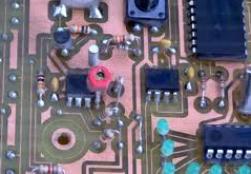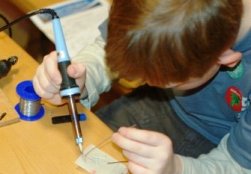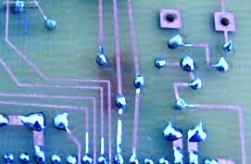Categories: Novice electricians, About electricians and not only
Number of views: 24557
Comments on the article: 1
Why electricians are not always friends with electronics
It seems that this question has little concern for those electricians who are engaged only in household wiring: is there a lot of electronics in it? Wires, switchboards, circuit breakers, sockets, bulbs. They are more often found with electronics, and, unfortunately, electricians do not really penetrate into it at the factory. Seeing a simple diode bridge they say: "No, there is electronics, we will not touch it."
Electronics is now everywhere
 Now, thanks to the efforts of our Chinese brothers, various electronic devices are increasingly penetrating even into household wiring. These are various calls at the front doors, Christmas lights and garlands, sockets and switches that are triggered by a television remote control, devices for extending the life of incandescent lamps (delay when turned on), photo sensors to turn on lighting, electronic transformers to power low-voltage halogen lamps, spotlights with motion sensors and much more.
Now, thanks to the efforts of our Chinese brothers, various electronic devices are increasingly penetrating even into household wiring. These are various calls at the front doors, Christmas lights and garlands, sockets and switches that are triggered by a television remote control, devices for extending the life of incandescent lamps (delay when turned on), photo sensors to turn on lighting, electronic transformers to power low-voltage halogen lamps, spotlights with motion sensors and much more.
Popular recently energy-saving lamps inside their base have a simple electronic circuit with only two transistors. And fluorescent lamps, remember, those with roaring chokes and blinking when turned on? Now, instead of chokes, electronic ballast is used, which does not roar and ensures switching on without any blinking. The circuit of such an electronic ballast is very similar to the filling of energy-saving lamps.
Many of these devices can be repaired at home, provided that you are not afraid of electricity, a little versed in electronics and strive to gain new knowledge.
Where to get special education
 To perform the mentioned repair work, it is not at all necessary to have a university education of the appropriate profile. A lot of people who are well versed in electronic circuits, and involved in the repair of a fairly sophisticated electronic equipment, received their "electronic education" thanks to an independent study of the theory.
To perform the mentioned repair work, it is not at all necessary to have a university education of the appropriate profile. A lot of people who are well versed in electronic circuits, and involved in the repair of a fairly sophisticated electronic equipment, received their "electronic education" thanks to an independent study of the theory.
The theory can be studied by mass radio magazines and textbooks for technical schools and vocational schools, in which there are much fewer integrals and complex formulas. These textbooks are easier to understand than textbooks for high schools, although one and the same subject is explained. If you also collect the various schemes described in these magazines, you can get a lot of practical experience. In the journal Radio, such self-taught people are called engineers without a diploma.
As one of the good textbooks, we can recommend the book by Rudolf Svoren “Electronics step by step. Practical Encyclopedia of a Young Radio Amateur. ” Publishing House "Children's Literature" 1991. It may be embarrassing for someone that the book is for children, but in it, almost on the fingers, many of the subtleties and tricks of electronic technology are told. Even if you don’t even read the whole book from cover to cover, you can always find a forgotten formula in it or recall the meaning of a physical phenomenon.
What if I burn something?
 Everyone, of course, heard about Murphy's laws. But repairmen of electronic equipment are guided by Horner’s law, which states that experience grows in proportion to the number of equipment that is out of order. It is sad, but it really is.
Everyone, of course, heard about Murphy's laws. But repairmen of electronic equipment are guided by Horner’s law, which states that experience grows in proportion to the number of equipment that is out of order. It is sad, but it really is.
Here you need to be especially careful and careful: if, during the repair of household wiring, a short circuit will only cause the circuit breaker to trip or fuse fuses to blow, then in the electronic device the smallest spark can lead, if not tragic, then rather serious consequences. The last sentence does not in any way indicate neglect of the wiring.
A simple example, or rather a bad case from practice. When repairing a very powerful amplifier, even after turning off, the electrolytic capacitors in the power supply remain charged for a very long time. The accidental closure of the legs of the voltage regulator led to the burnout of several chips at once, which, of course, had to be changed. This is a good example of Horner's law in action. A large role in this episode was played by simple sloppiness and inattention, and not by inexperience, although this event contributed to a certain extent to the increase in experience.
And yet you do not need to be afraid of repairing electronic equipment. Acquaintance with electronics usually begins with the manufacture of simple circuits that do not require adjustment, begin to work immediately. Unless, of course, everything is assembled neatly and without errors. Various flashers and tweeters are most suitable for such first experiments. classic multivibrator.
Good repeatability is possessed by circuits assembled on digital logic, for example, the K155 or K561 series. You can also try to collect a simple audio amplifierwhat is best done using a specialized chip.
This can be, for example, domestic K174UN7, imported TDA2030, or TDA7294. the latter will allow you to assemble an amplifier with an output power of at least 50W. The cost of such a chip does not exceed the cost of two output transistors for the amplifier. Usually the path to amateur radio and electronics begins with the first "talking" design.
Where to start the study of electronics, so that such sad phenomena were as few as possible? And you should start first of all with studying the theory and the element base, that is, all that electronic devices are assembled from.
Read on in the next article ...
Read on here: Where to start studying electronics
Boris Aladyshkin
See also at i.electricianexp.com
:
